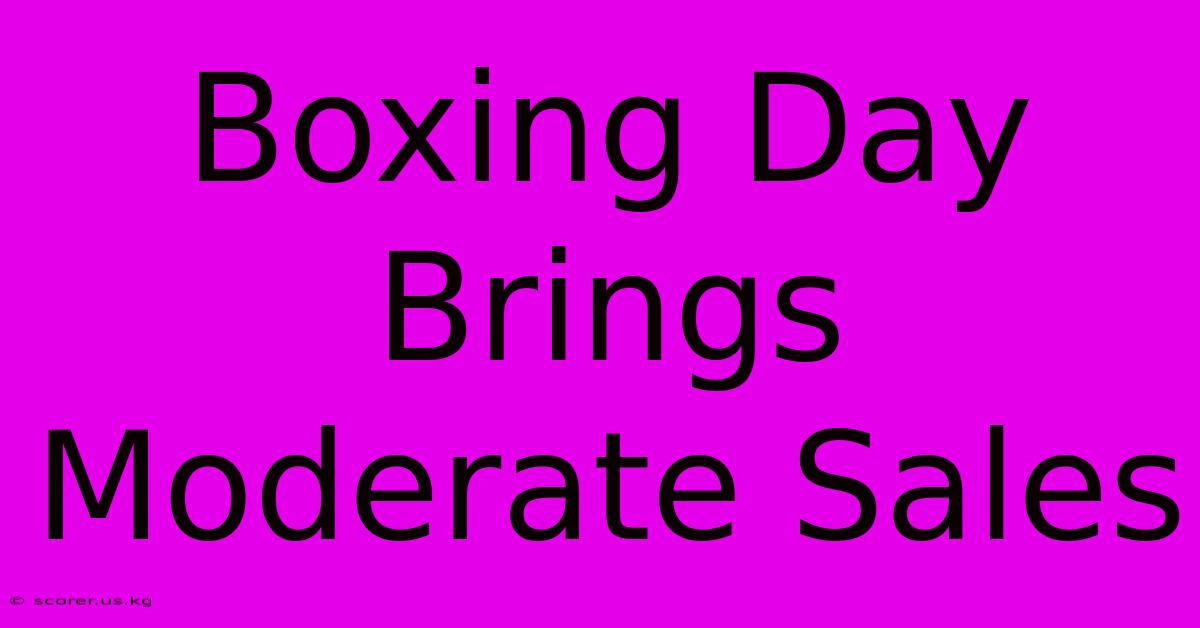Boxing Day Brings Moderate Sales

Discover more detailed and exciting information on our website. Click the link below to start your adventure: Visit Best Website scorer.us.kg. Don't miss out!
Table of Contents
Boxing Day Brings Moderate Sales: A Shift in Consumer Spending
Boxing Day, traditionally a day of frenzied bargain hunting, saw a more moderate level of sales this year. While retailers still reported activity, the post-Christmas shopping spree didn't reach the heights of previous years. This shift suggests a change in consumer behavior, influenced by several key factors.
The Changing Landscape of Boxing Day Sales
For many years, Boxing Day was synonymous with massive queues outside stores and online shopping carts overflowing with discounted goods. This year, however, the atmosphere was noticeably different. While discounts remained a major draw, the sheer volume of shoppers appeared subdued. This isn't necessarily a sign of economic doom, but rather a reflection of evolving consumer habits.
Factors Contributing to Moderate Sales
Several factors contributed to the more moderate sales figures reported on Boxing Day:
-
Inflation and Cost of Living Crisis: The rising cost of living has undoubtedly impacted consumer spending. Many shoppers are more budget-conscious, carefully considering purchases and prioritizing essential items. The allure of a discounted non-essential item might be less compelling when faced with rising energy bills and food prices.
-
Early Black Friday and Cyber Monday Sales: The extended sales periods leading up to Christmas, including Black Friday and Cyber Monday, likely impacted Boxing Day sales. Shoppers may have already secured their desired deals earlier in the season, leaving less demand for Boxing Day discounts.
-
Shift to Online Shopping: The convenience of online shopping continues to grow in popularity. While physical stores still played a role, a significant portion of Boxing Day sales likely occurred online. This makes direct comparison of sales figures more challenging, as online sales data isn't always immediately available.
-
Changing Consumer Priorities: Consumer priorities are shifting. Experiences and sustainability are increasingly valued. This means that some shoppers may be less focused on material possessions and more interested in investing in experiences or supporting environmentally conscious brands.
What Does This Mean for Retailers?
The moderate Boxing Day sales figures present a challenge for retailers. They need to adapt to the changing consumer landscape and develop strategies that resonate with the modern shopper. This may involve:
-
Diversifying Sales Strategies: Relying solely on Boxing Day sales is no longer a sustainable approach. Retailers should consider spreading out sales throughout the year to cater to the evolving spending habits of consumers.
-
Focusing on Customer Experience: Providing a seamless and enjoyable shopping experience, both online and in-store, is crucial. This includes personalized service, efficient checkout processes, and clear communication.
-
Emphasis on Value and Sustainability: Consumers are increasingly seeking value for their money and supporting sustainable brands. Retailers need to highlight the value proposition of their products and emphasize their commitment to ethical and sustainable practices.
The Future of Boxing Day Sales
It's unlikely that Boxing Day will disappear completely as a shopping event. However, its significance may diminish as consumer behavior continues to evolve. Retailers need to adapt their strategies to ensure they remain competitive in the changing retail landscape. The moderate sales this year serve as a wake-up call, highlighting the need for innovation and a customer-centric approach. The future of Boxing Day sales hinges on the ability of retailers to understand and respond to the evolving needs and priorities of consumers.

Thank you for visiting our website wich cover about Boxing Day Brings Moderate Sales. We hope the information provided has been useful to you. Feel free to contact us if you have any questions or need further assistance. See you next time and dont miss to bookmark.
Featured Posts
-
Haaland Flashpoint Colemans Man City View
Dec 27, 2024
-
Reed Sacks Williams 11 Yard Loss
Dec 27, 2024
-
40 Years Of Premier League Stadiums
Dec 27, 2024
-
Liverpool Defeats Leicester 3 1 Match Report
Dec 27, 2024
-
New Chinese Advanced Fighter Jet
Dec 27, 2024
